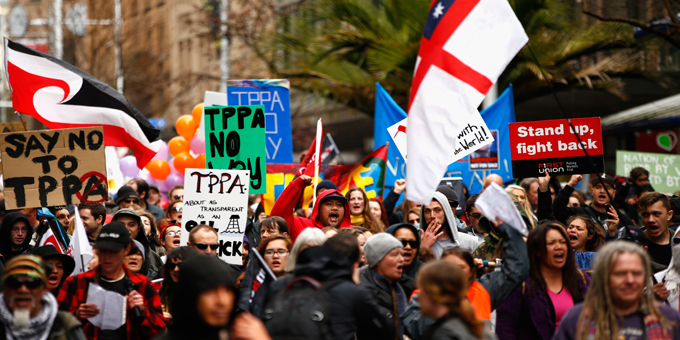Tight timeframe ahead of TPP negotiations

Radio NZ | 26 October 2017
Tight timeframe ahead of TPP negotiations
by Jane Patterson
The first order of business for newly appointed Trade Minister David Parker will be to renegotiate New Zealand’s position with the other ten countries, with important decisions about the future of the deal to be made on the sidelines of the APEC summit in Vietnam early next month.
New Zealand has helped spearhead efforts to keep the TPP alive after United States president Donald Trump made good on his promise to withdraw from the agreement.
Under the former Trade Minister Todd McClay, New Zealand had pushed for the substance of the original deal to be carried over into a new TPP-11 agreement.
But the new Labour-led government will take a different approach, incoming Prime Minister Jacinda Ardern said.
After unveiling her party’s deal with New Zealand First, Ms Ardern said there was a great deal of consensus between the two parties about the agreement, "particularly around banning foreign overseas buyers from purchasing existing homes and also ongoing concerns with ISDS [investor-state dispute settlement] clauses".
She confirmed the new government would seek to renegotiate but would not go into detail, so as not to compromise New Zealand’s position.
The government was aware of the broader considerations, she said.
"We both support increasing exports and export growth for New Zealand and representing those who are exporting to the best of our ability."
National’s Todd McClay said it was important the deal was not weakened and that the new government proceeded cautiously.
"Everything possible has been done to give New Zealand the best chance of delivering a high quality deal."
The meeting in Vietnam would be "extremely important", he said.
Former trade negotiator Charles Finny said New Zealand may be able to implement a policy under which foreign buyers could buy residential houses here, without the need to actually renegotiate terms.
"TPP has more flexibility in it than, say, the New Zealand-Korea free trade agreement," he said.
"The problem with TPP is that literally people are hoping to get [it] agreed by APEC leaders at the meeting in Vietnam."
New Zealand International Business Forum spokesman Stephen Jacobi agreed there might not be a need to renegotiate around the foreign ban.
Any change to Investor State Dispute provisions, which allow foreign investors to sue governments, would be more problematic, he said.
"It seems to me quite difficult to imagine that TPP-11 will come into force without [the provisions].
"If that is really what they’re wanting then that is potentially a lot more complicated - I’m not sure the other parties are going to agree to that."
The new government has acknowledged the likely need to renegotiate the New Zealand-Korea deal.
Mr Finny said there may be a solution, as he believed Korea was keen to join the TPP, and quite quickly.
"That would give us a wonderful opportunity at the point Korea was negotiating the TPP to get it to agree to the changes we are requesting, if we are requesting any."
The next step is an officials’ meeting in Japan at the end of the month, before world leaders and trade ministers head to Vietnam.





